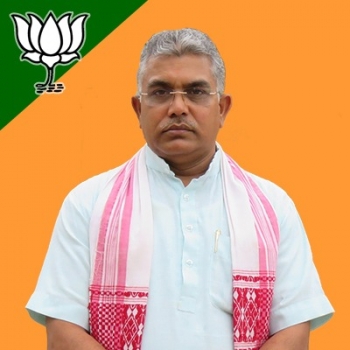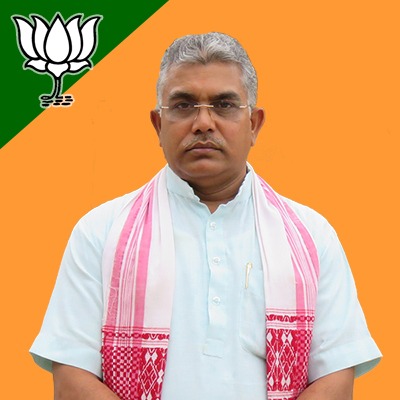
 A. J. Philip
A. J. Philip

Dear Shri Dilip Ghosh,
I was startled by your comments on Nobel-laureate Amartya Sen, whom you called a “land-grabber”. I thought I should not only set the record straight but also remind you that you know nothing about Sen and his contributions to India, nay the world.
I know your worldview is that of the RSS, where you had your political baptism. You toiled for long years as a ‘pracharak’ (foot soldier) of the RSS in Andaman and Nicobar islands and you have been rewarded with several posts, including the presidentship of the BJP in West Bengal.
I have no intention of questioning your political thoughts and your habit of drinking cow urine. Those are your personal issues about which I have no complaints. However, I found it unbelievable that a political leader leading a party like the BJP in West Bengal would call Prof Sen a land-grabber.
I would like you to know how Prof Sen got connected with Shantiniketan (the abode of peace). In the ordinary circumstances, he would not have grown up there. In fact, his family belonged to Dakha, “a big, bustling place of first-rate importance” in Jane Austen’s time, now the capital of Bangladesh.
Dhaka was famous the world over for the finest muslin produced there. However, it could not face competition from Manchester, as the British promoted import of clothes, sounding the death-knell of the indigenous garment industry. India was one large, contiguous market for them.
Sen’s father, Ashutosh, had done his Ph.D in chemistry from London University and was at that time heading the agricultural chemistry department at Dacca University. “The Sens lived in a typical Dhaka house, fifty or sixty feet long, narrow in the front, “the middle being a courtyard open to the sky” with plenty of rooms for servants and relatives”.
Sen began his education at an English missionary school in 1939. Two years later, the Japanese advanced towards British India. Also, pre-partition tension began to rise in Dhaka and Kolkata. To save him from “bombs”, Sen was sent to Shantiniketan, where his maternal grandfather Kshiti Mohan Sen, popularly known as KM Sen, was a faculty member at Visva-Bharati University.
That is how Sen’s connection with Shantiniketan began. Now, let me tell you some history. Long before Amartya (the one who conquered death) was born, Maharshi Debendranath Thakur, the father of Rabindranath Tagore, bought 20 bighas of land in Bengal’s Birbhum province and built up an ashram called Shantiniketan (Article by Amitava Chakraborty, Indian Express, January 10).
As you know, Thakur was a Brahmo, who believed in a formless God. Everyone was welcome to meditate on this God there. Once I visited the place, set in sylvan surroundings, and I would urge you also to do so on your regular visits to the area. It will do you good.
The Brahmo Samaj in Bengal, like the Arya Samaj in the North, was growing at that time. The Samaj had new adherents like Sardar Dyal Singh Majithia, who founded The Tribune at Lahore as a preeminent nationalist newspaper. Eminent film producer Satyajit Ray’s family also belonged to the Brahmo Samaj.
When Rabindranath Tagore became the first Asian to win the Nobel in 1913 for his book of poetry titled Gitanjali, his fame spread the world over. He had already set up a small school at Shantiniketan which also became famous. He utilised the Nobel Prize money to set up Visva-Bharati, declared a Central University a decade after the poet-laureate died on August 7, 1941.
It had alumni as famous as Indira Gandhi, who became India’s Prime Minister, and Maharani Gayatri Devi, who was dumped in a prison along with prostitutes and pickpockets during the Emergency by the more famous alumnus (A Princess Remembers). As mentioned, Prof Sen grew up at Shantiniketan. He attended the school there. His free time was spent mostly with his grandfather.
Sen’s biographer Sylvia Nasar of ‘A Beautiful Mind’-fame quotes him in her book the ‘Grand Pursuit’, “Everyone found him formidable. He woke up at four. He knew all the stars. He talked with me about the connections between Greek and Sanskrit. I was the only one of the grandchildren who had a sense of academic vocation. I was going to be the one who carried the mantle”.
Now, you know how Sen became a part of Shantiniketan. Please don’t be under the impression that KM Sen was keen to come to Shantiniketan and settle down there. In fact, he did not want to leave Varanasi, now represented by Narendra Modi, where he was acquiring knowledge, not only about Hinduism but also about the various traditions that constitute India, that is Bharat.
As the grandson mentioned in the afore-said quotation, KM Sen was a master of not only Sanskrit but also of several Indian languages, including Gujarati. Tagore knew about his scholarship and wanted him to be on the Visva-Bharati faculty. He had to use all his persuasive skills to bring KM Sen to Shantiniketan.
Once he accepted the invitation, there was no turning back for KM Sen, who was Tagore’s right-hand man on the campus. They complemented each other. He was given a plot of land on the western side of the campus where he built a small, beautiful bungalow with a driveway that begins and ends at the gate.
Since it was the last house on the western side, it was called ‘Pratichi’ which means “Westend”. By the way, Westend was the brand name of a popular British-era watch that my father bought when he served the British-Indian Army in the Burmese sector. Now, you know why Prof Amartya Sen’s house is called Pratichi. Where is the land-grab in this?
I had an occasion to visit Pratichi, where Prof Sen told me that he always looked forward to visiting Shantiniketan. What he enjoyed most was cycling on the campus. And you call him a land grabber! Do you know who made him a Bharat Ratna (India’s Jewel), the highest honour an Indian can get?
He was conferred this title when Atal Bihari Vajpayee was the Prime Minister. I do not have to tell you that he was, like you, an RSS pracharak before becoming a Jan Sangh-turned-BJP leader. When you call him a land-grabber, you are also abusing the late Vajpayee.
I must also tell you something more about Vajpayee and Sen. When Prof Sen received the Nobel Prize for economics in 1998, and set up two Trusts, one for India and another for Bangladesh, Vajpayee made an announcement that the Union Government would give a matching grant to the Pratichi (India) Trust.
As I was at that time the Director of the Trust, I know that the money was received in its account. Usually, the government makes many conditions while giving a grant but no such condition was attached to the grant. Would Vajpayee have been so gracious if the professor was a land-grabber, as you claim him to be?
Around that time, the then Chief Minister, the late Jyoti Basu, made an announcement that a plot of land would be allotted to the Trust in the Salt Lake area in Kolkata. It was my job to get the plot allotted in the Trust’s name.
One morning, I went to the Writer’s Building in Kolkata to meet the officials concerned. I walked into an IAS officer’s cabin with my visiting card. He was actually thrilled to meet me, as I represented Prof Sen. He called a junior official and introduced me to him. He was given an assignment. His only job that day was to accompany me and facilitate my work.
You may not believe that by 4 pm the same day, I paid the registration fee and had the necessary papers signed. The person who helped me asked for a favour as I was about to leave. When I heard “favour”, I thought he was going to ask me for a bribe. No, all he wanted was an autograph of Prof Sen for his son, who was a fan of the economist.
This was possible, not because I was capable but because I represented Prof Sen. Let me also add that the only Bengali sentence I could speak was “Ami tomake bhalobasi”. That did not prevent me from getting my work done that day. I must also add something more here.
As Director, one of my dreams was to build a four-storied building to house the Trust. A plan was got readied by a famous architect. I also had some plans to raise resources for the building project. That is when Prof Sen poured cold water over my dream.
“Mr Philip, you can raise any money but you should not use my name for the purpose”. How could I raise at least Rs 5-6 crore required for the project without using his name? Who will give me money if I do not mention his name? He wanted a small, single-storied building to accommodate the Trust staff, who were mostly researchers.
In a way, Sen was right. A big building will be costly to maintain if there are no high-rent paying tenants. I have not so far visited the Pratichi building at Salt Lake and I do not know how big or small it is. The point is, where is land-grabbing in all this?
You have rhetorically asked what Sen has done for the state and the country. You have also mentioned that nobody cared for him in West Bengal. I have once travelled with him from Kolkata to Shantiniketan and back. I was not able to talk to him during the journey, as passengers were getting his autograph on rail tickets, newspapers, magazines, books and whatever they had with them. He obliged everyone, though it would have been quite boring to do so.
I do not know whether you know about a person called Robert Solow. He also won the Nobel for his theory of economic growth. Do you know what he said about Prof Sen? He said “Sen is the conscience of our profession”. Can there be a better compliment than this?
Yet, you call him and his grandfather KM Sen names. As I mentioned, KM Sen was a great scholar. So great that Dr S. Radhakrishnan, who was President of India, once suggested to Penguin publishers to approach KM Sen to write a primer on Hinduism. He had a weakness. He did not have a good command of the English language. Penguin wanted the book in English.
KM Sen wrote it in Bengali and the book was translated into English by Sisir Kumar Ghosh. Later, on his grandfather’s insistence, Prof Sen translated it into English with a long Foreword. Titled ‘Hinduism’, it came out in 1961, a year after KM Sen died.
It is a small book of a little over 100 pages. It explains in brief the salient features of Hinduism. It also contains extracts from Hindu religious texts like the Vedas, the Upanishads and the Mahabharata. One will get a good idea of Hinduism. I found the book very useful.
I would request you to read it. Then you will know that Hinduism is not about drinking urine and shouting Jai Shri Ram. Instead, Hinduism is a product of many cultures and traditions which has generated and assimilated the religious movements of India over 5,000 years. You will also know more about the Bauls of West Bengal, if you read the book.
Come to think of it, you have ridiculed such a great personality as KM Sen in the mistaken belief that it will go well with your followers. If Tagore used his Nobel money to set up Visva-Bharati, Prof Sen is using his Nobel prize money to do pioneering research in the field of primary education and public health. Please keep the Sens away from your petty politics.
Yours etc
ajphilip@gmail.com